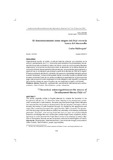| dc.rights.license | http://creativecommons.org/licenses/by-nc-sa/3.0/ve/ | |
| dc.contributor.author | Mallorquín, Carlos | |
| dc.date.accessioned | 2013-01-22T13:44:55Z | |
| dc.date.available | 2013-01-22T13:44:55Z | |
| dc.date.issued | 2013-01-22T13:44:55Z | |
| dc.identifier.issn | 1856-349X | |
| dc.identifier.uri | http://www.saber.ula.ve/handle/123456789/36436 | |
| dc.description.abstract | Originalmente escrito en inglés, el articulo trata de subrayar una transición en la
actitud y pensamiento de A. O. Hirschman para referirse a la problemática del desarrollo construida en América Latina del mismo modo en que la reciente literatura
anglosajona ha asumido los discursos sobre el desarrollo en la última década sin
conocer la historia del pensamiento latinoamericano: se sorprenden del surgimiento y aparición de un vocabulario que emergió a partir de la década de 1950 en la región. El desconocimiento del idioma y el intento de superar la colonialidad del saber genera a veces “sorpresas”, incluso entre quienes tienen una actitud positiva y abierta hacia el saber construido fuera de los centros académicos anglosajones: la ignorancia se paga cara porque el mundo anglosajón no está obligado a leer español o portugués de la misma manera en que a nosotros se nos exige leer el inglés o el francés. | es_VE |
| dc.language.iso | es | es_VE |
| dc.rights | info:eu-repo/semantics/openAccess | |
| dc.subject | Desarrollo | es_VE |
| dc.subject | subdesarrollo | es_VE |
| dc.subject | pensamiento latinoamericano | es_VE |
| dc.subject | estructuralismo | es_VE |
| dc.subject | Celso Furtado | es_VE |
| dc.subject | Raul Prebisch | es_VE |
| dc.subject | poder | es_VE |
| dc.subject | asimetrías | es_VE |
| dc.title | El desconocimiento como origen del Déjà vú en la teoría del desarrollo | es_VE |
| dc.title.alternative | Theoretical misrecognitions as the source of Development theory Déjá vú | es_VE |
| dc.type | info:eu-repo/semantics/article | |
| dc.description.abstract1 | The article, originally written in English,attempts to underlie the transition in the thought and attitude of A. O. Hirschman when referring to the development problematic constructed in Latin America, the same way that recent Anglo-Saxon literature has assumed the discourses on development in the last decade in the region without knowing the history of Latin American thought: it´s startled by the appearance and origin of the vocabulary founded in the region from the 1950´s onwards. The ignorance of the language and the efforts to defeat the coloniality of knowledge sometimes generates “surprises”, even among those that have an open and positive attitude towards a knowledge that was constructed outside Anglo-Saxon academic circles: ignorance is costly because the Anglo-Saxon world is not required to read in Spanish or Portuguese, the way we are compulsory enforced to read English or French. | es_VE |
| dc.description.colacion | 155-204 | es_VE |
| dc.description.email | cmallorquin@hotmail.com | es_VE |
| dc.description.frecuencia | Semestral | |
| dc.identifier.depositolegal | l.f.07620053303358 | |
| dc.publisher.pais | Venezuela | es_VE |
| dc.subject.centroinvestigacion | Centro de Estudios de Fronteras e Integración (CEFI) | |
| dc.subject.facultad | Núcleo Táchira (NUTULA) | es_VE |
| dc.subject.institucion | Universidad de Los Andes | es_VE |
| dc.subject.keywords | Development | es_VE |
| dc.subject.keywords | underdevelopment | es_VE |
| dc.subject.keywords | Latin American thought | es_VE |
| dc.subject.keywords | structuralism | es_VE |
| dc.subject.keywords | power | es_VE |
| dc.subject.keywords | asymmetries | es_VE |
| dc.subject.publicacionelectronica | Cuadernos sobre Relaciones Internacionales, Regionalismo y Desarrollo | |
| dc.subject.seccion | Cuadernos sobre Relaciones Internacionales, Regionalismo y Desarrollo: Artículos | es_VE |
| dc.subject.tipo | Revistas | es_VE |
| dc.type.media | Texto | es_VE |


